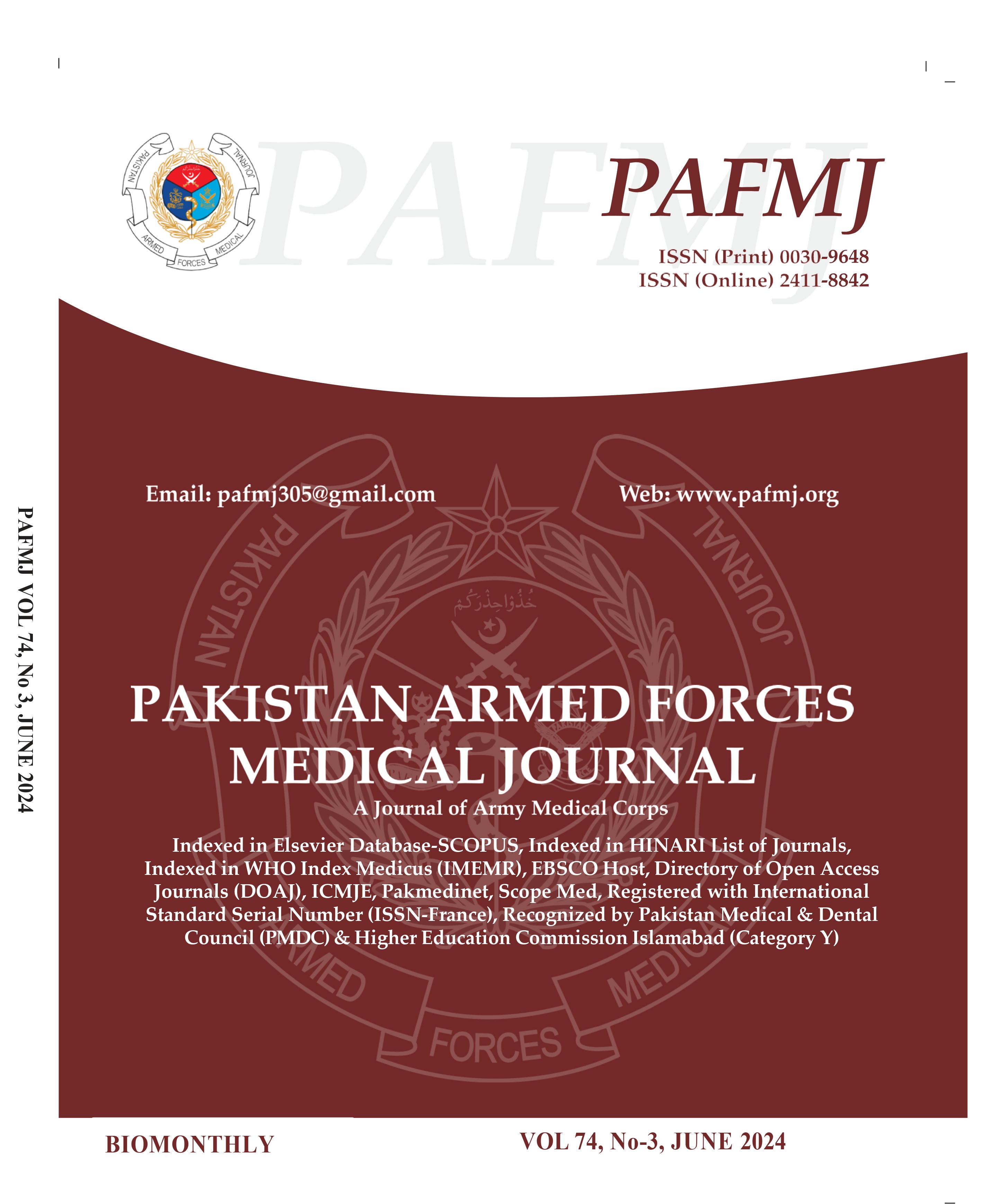Frequency of Tension-type Headache in Females Presenting with Chronic Daily Headaches
DOI:
https://doi.org/10.51253/pafmj.v74i3.6891Keywords:
Exercise, Headache, Sleep, Smoking, Tension-type headachezAbstract
Objective: To assess the role of non-pharmacological interventions in relieving Tension-type headache.
Study Design: Quasi experimental study
Place and Duration of Study: Neurology department, Pak Emirates Military Hospital, Rawalpindi Pakistan, from Dec 2020 to May 2021.
Methodology: Tension-Type Headache was diagnosed by physician using the International Classification of Headache Disorders III (ICHD-III). Patients were randomized into two groups, Group-A was intervention Group and Group-B was the control group. Both the groups were followed at 14 and 30 days. Visual analogue pain (VAP) scale and Headache Intensity Test 6 (HIT) was applied to evaluate the intensity of headache.
Results: Out of 600 patients with chronic daily headaches, 210(34%) patients had Tension-type headache. The mean age of these females was 35.4± 9.342 years. A total of 112(53%) were working, 172(81.9%) were married. In terms of level of education, 68(32.4%) had done matriculation, 29(13.8%) had done FSc. and 113(53.8%) had completed higher education. At 28 days post intervention, there was significant improvement in Headache Impact Test (HIT) score (43.26±4.48 vs 49.81±5.52, p-value <0.05) and visual analogue pain scale (3.19±1.481 vs 4.30±2.052, p-value <0.05), in Groups A and B respectively.
Conclusion: There was improvement in intensity of mild to moderate Tension-type headache after nonpharmacological intervention.
Downloads
References
Göbel H, Petersen‐Braun M, Soyka D. The epidemiology of headache in Germany: a nationwide survey of a representative sample on the basis of the headache classification of the International Headache Society. Cephalalgia 1994; 14(2): 97-106. https://doi.org/10.1046/j.1468-2982.1994.1402097.x
Jensen RH. Tension‐type headache–the normal and most prevalent headache. J Headache Pain 2018; 58(2): 339-345. https://doi.org/10.1111/head.13067
Attanasio V, Andrasik F. Further examination of headache in a college student population. J Headache Pain 1987 ; 27(4): 216-223. https://doi.org/10.1111/j.1526-4610.1987.hed2704216.x
Alzoubi KH, Mhaidat N, Khader Y, Salem S, Issaifan H, Haddadin R. Prevalence of migraine and tension-type headache among adults in Jordan. J Headache Pain 2009; 10(4): 265-270. https://doi.org/10.1007/s10194-009-0122-6
Neufeld JD, Holroyd KA, Lipchik GL. Dynamic assessment of abnormalities in central pain transmission and modulation in tension‐type headache sufferers. J Headache Pain 2000; 40(2): 142-151. https://doi.org/10.1046/j.1526-4610.2000.00020.x
Stovner LJ, Nichols E, Steiner TJ, Abd-Allah F, Abdelalim A, Al-Raddadi RM et al. Regional, and national burden of migraine and tension-type headache. 1990–2016: a systematic analysis for the Global Burden of Disease Study 2016. The Lancet Neurol 2018; 17(11): 954-976. https://doi.org/10.1016/S1474-4422(18)30322-3
Wittrock DA. The comparison of individuals with tension‐type headache and headache‐free controls on frontal EMG levels: a meta‐analysis. J Headache Pain. 1997; 37(7): 424-432. https://doi.org/10.1046/j.1526-4610.1997.3707424.x
Rasmussen BK, Jogensen T, Jensen R, Lyngberg AC. Incidence of Primary Headache: A Danish Epidemiologic Follow-up Study. Am J Epidemiol 2005; 161(11).
https://doi.org/10.1093/aje/kwi139
Krøll LS, Hammarlund CS, Linde M, Gard G, Jensen RH. The effects of aerobic exercise for persons with migraine and co-existing tension-type headache and neck pain. A randomized, controlled, clinical trial. Cephalalgia 2018; 38(12): 1805-1816. https://doi.org/10.1177/0333102417752119
Gaist D, Garde E, Blaabjerg M, Nielsen HH, Krøigård T, Østergaard K, et al. Migraine with aura and risk of silent brain infarcts and white matter hyperintensities: an MRI study. Brain 2016; 139(7): 2015-2023.
https://doi.org/10.1093/brain/aww099
Welch MK, Goadsby PJ. Chronic daily headache: nosology and pathophysiology. Curr Opin Neurol 2002 ; 15(3): 287-295.
https://doi.org/10.1097/00019052-200206000-00011
McDermaid CS, Hagino C, Vernon H. Systematic review of randomized clinical trials of complementary/alternative therapies in the treatment of tension-type and cervicogenic headache. Complement Ther Med 1999 1; 7(3): 142-155.
https://doi.org/10.1016/s0965-2299(99)80122-8
Jonsson P, Hedenrud T, Linde M. Epidemiology of medication overuse headache in the general Swedish population. Cephalalgia 2011; 31(9): 1015-1022.
https://doi.org/10.1177/0333102411410082
Desouky DE, Zaid HA, Taha AA. Migraine, tension-type headache, and depression among Saudi female students in Taif University. J Egypt Public Health Assoc 2019; 94(1): 7.
https://doi.org/10.1186/s42506-019-0008-7
Abdo SA, Amood Al-Kamarany M, Alzoubi KH, Al-Maktari MT, Al-Baidani AH. Primary headache in Yemen: prevalence and common medications used. Neurol Res Int 2014; 2014: 808126. https://doi.org/10.1155%2F2014%2F808126
Rasmussen BK, Jensen R, Olesen J. Impact of headache on sickness absence and utilisation of medical services: a Danish population study. J Epidemiol community Health 1992; 46(4): 443-446.
https://doi.org/10.1136/jech.46.4.443
Martin PR, MacLeod C. Behavioral management of headache triggers: Avoidance of triggers is an inadequate strategy. Clin Psychol Rev 2009; 29(6): 483-495.
https://doi.org/10.1016/j.cpr.2009.05.002
Huang J, Shen M, Qin X, Guo W, Li H. Acupuncture for the Treatment of Tension-Type Headache: An Overview of Systematic Reviews. Evid Based Complement Alternat Med 2020; 2020: 4262910.
Downloads
Published
Issue
Section
License
Copyright (c) 2024 Taimoor Saleem, Bassam Khalid, Umer Naseer, Mehmood Hussain, Hamna Ahmed Khan, Khurram Haq Nawaz

This work is licensed under a Creative Commons Attribution-NonCommercial 4.0 International License.















